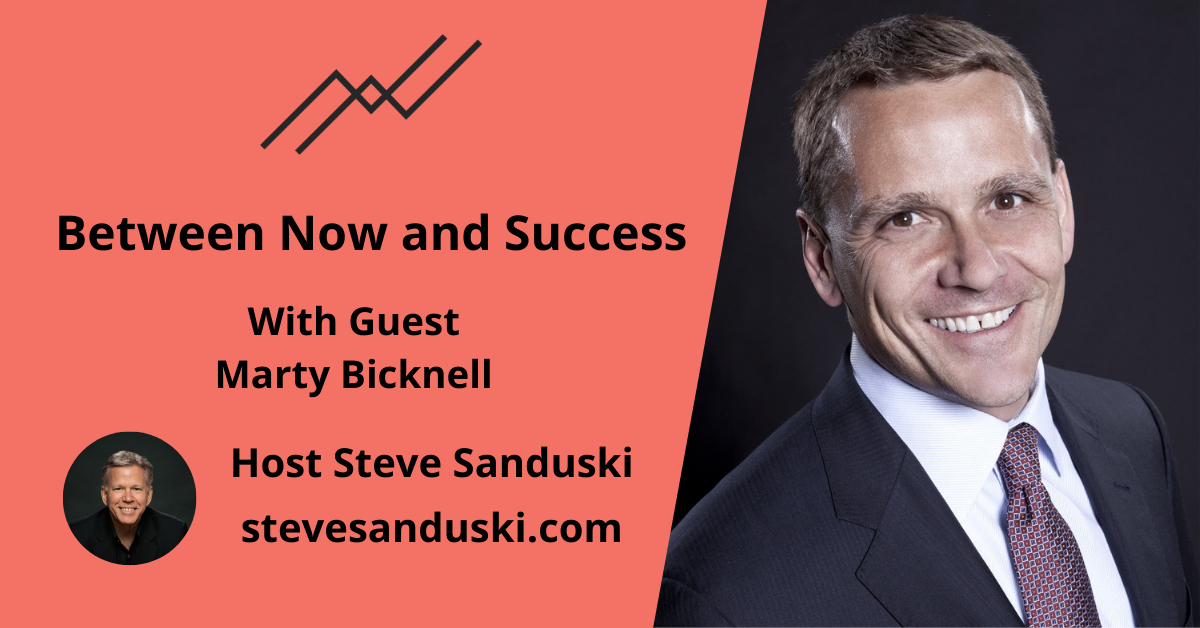Paul Tudor Jones did it for hedge fund managers. Michael Saylor and Jack Dorsey did it for publicly traded companies.
Now, Marty Bicknell is doing it for RIAs and he discusses it with me on my new podcast.
Once called “rat poison squared” by Warren Buffett, bitcoin is now going mainstream. After a tumultuous 12-year existence punctuated by head-spinning bull markets, devastating declines, exchange hacks, and its use in criminal activities, bitcoin has grown into adulthood.
Bicknell recently announced that his firm, the $35 billion AUM behemoth Mariner Wealth Advisors, will offer bitcoin to its clients through a separately managed account run by Eaglebrook Advisors.
To date, only a small number of intrepid advisors, including Morgen Rochard, Jackson Wood, Adam Pokornicky, Tyrone Ross, Adam Blumberg, and Isaiah Douglas, have done the pioneering work of understanding bitcoin, figuring out the compliance and operational details of offering it, and presenting it to their clients as part of a thoughtful asset allocation.
Why Bitcoin Now?
On my podcast, Bicknell said, “We have 325 advisors today, and I would tell you all of them, every single one of them have had at least two or three clients ask them about it.”
Interestingly, there was much more FOMO about bitcoin back in late 2017 when it soared to nearly $20,000 before crashing to below $4,000 in 2018. Recently, bitcoin roared back to a new all-time high but without the breathless hype of three years ago—to me a sign of its maturation as an investment.
Yes, bitcoin will experience crazy volatility again. But as Bicknell said, “Regardless of where we are in the cycle of this, it’s something that clients want.”
What Kind of Bitcoiner Are You?
When it comes to bitcoin, there are three camps.
- Maximalists. These are the true believers. They believe bitcoin is the only cryptocurrency worth caring about and that it leads to freedom from centralization, censorship, currency debasement, and bad governance, while leading toward individual freedom, security, and choice. Maximalists sell their chairs to buy more coins and “stack sats.”
- Investors. They “get it.” They see bitcoin as a legitimate investment, an opportunity for asymmetrical gain, but they’re not zealots. While understanding the technology behind it, they view it as a way to make money, a macro type investment to improve a portfolio’s risk adjusted return. It’s not about love or religion and they’ll sell it if it’s no longer “working.”
- Deniers. They refuse to accept the validity of bitcoin. They see it as a Ponzi scheme, a way for criminals to transact business and launder money, and just one hack or software bug away from complete meltdown. They’re conservative investors who like to stick with traditional asset classes.
Few financial advisors are Maximalists. Most Maximalists have roots in the cypherpunk community or technology industry, or have strong Libertarian beliefs. Some advisors are still Deniers but my guess is most of them could become Investors if they adopted an open-minded attitude and spent more time researching what bitcoin is, why it came to be, and how it works: i.e., going down the rabbit hole.
With zero hacks of the Bitcoin network itself (the hacks have been of the exchanges that hold bitcoin or wallets that store bitcoin), the ever-expanding number of miners who ensure the integrity of the network, and the fact that bitcoin hasn’t surrendered its “lead dog” position in the crypto universe, many more advisors are moving into the Investors camp.
“Certain advisors believe that, frankly, this should be in everybody’s portfolio,” said Bicknell.
What Should You Do?
We’re past the point where advisors can ignore bitcoin or cryptocurrencies. Clients and prospects are starting to ask about them and if you don’t have an informed response, they’ll move on to another advisor who is conversant.
Here’s what I recommend you do as it relates to cryptocurrencies.
- Learn. Do your homework and learn about cryptocurrencies. There are three areas you should focus on. First, get context. This 3-part series from Robert Breedlove on Money, Bitcoin and Time is a good place to start. CaseBitcoin is also a great website for info. Second, understand the technology. The Inventing Bitcoin book explains the Bitcoin system in an easy-to-understand way. You could also check out the Bitcoin Wiki. Third, understand the investment case for bitcoin. Check out Fidelity’s report here and Grayscale’s Financial Advisor Toolkit here. You should also read my Going Down the Rabbit Hole article here. And of course, start following crypto Twitter and listen to crypto podcasts. The What Bitcoin Did podcast hosted by Peter McCormack is a great listen.
- Invest. After you’ve done your initial learning, buy some bitcoin for your personal account. As an owner, you’ll now have an incentive to continue learning, to monitor it, and to understand the process for investing.
- Advise. After steps 1 and 2, you are now in a position to speak intelligently to clients and prospects about bitcoin and cryptocurrencies. If you decide cryptocurrencies are not right for your clients, that’s OK. The key is you’ve done your homework and can now make an informed, not a dismissive, decision about what makes sense.
In Bicknell’s case, his firm is taking a measured approach to rolling out bitcoin to its advisors and clients. “It was really important to us that the training and education piece be the center of it, so regardless of if that advisor uses the SMA or not, the training and education piece is going to lift their knowledge, and therefore, the client experience overall,” he said.
Mariner’s initial rollout stage of the bitcoin SMA consists of only 10 advisors. These 10 go through the training and education that is monitored by a senior investment committee team member and a compliance department official. Ultimately, a company official “gets to sign off on every single client that gets brought up for an account.”
And we’re not talking a large allocation of bitcoin to a client’s portfolio. “Today we think of it in the 1 – 2% range,” Bicknell said. Yet, a little bit can go a long way. A 2% allocation for a potential 10x or more return could make sense for investors with the right profile. Yes, bitcoin could crash again or even go to zero, but for the right clients, the risk/return trade-off could be attractive.
To be clear, Bicknell still thinks of bitcoin as a speculative investment. He says, “It’s not a perfect correlation, but think about it like you would Venture Capital, or something like that, where it’s very volatile, and there’s differences in, obviously, the management of those things. But the risk perspective, to me, is still the same.”
Differentiating Your Firm
I’ve been coaching advisors for years on the importance of differentiating your business and finding ways to make the decision to work with you a binary choice: meaning, there’s you and then there’s every other “commodity” advisor in your town lumped together. Bicknell has elevated this idea to a fine art.
From an investment perspective, you can’t differentiate your firm if you’re stuck using traditional assets like stocks, bonds, ETFs, and real estate. I can google that allocation and ACH money to Betterment.
By contrast, Bicknell says, “We like to find specialty themed, opportunistic investment products to bring to our clients.” Bitcoin fits that description and it’s one way he’s helping Mariner Wealth Advisors be on the winning side of the binary choice.
Bitcoin, of course, is not the only way Mariner differentiates itself from competitors. But it exemplifies the underlying ethos of a firm that wants to be an innovator, a leader in keeping itself and its clients on the front edge of a rapidly changing world.
Next Steps
In May 2020, the great hedge fund manager Paul Tudor Jones said his firm had invested about 1 – 2% of its assets in bitcoin. Back then he called it “a great speculation.” In a December 3, 2020 interview, he said, “I think crypto is going to have a crazy rocket ship ride up and down along the way but my guess is that something like bitcoin in particular will be substantially higher 20 years from now.”
Michael Saylor, the CEO of publicly traded MicroStrategy, led his firm to purchase 475 million dollars worth of bitcoin over the course of 2020. Saylor said, “Bitcoin is the world’s best treasury reserve asset & the emerging dominant monetary network. It is the solution to the store of value problem faced by every individual, corporation, & government on earth.”
Jack Dorsey, co-founder of Square, recently announced that Square had purchased 50 million dollars worth of bitcoin as part of its Treasury reserve assets. In 2018, Dorsey said, “The world ultimately will have a single currency, the internet will have a single currency. I personally believe that it will be bitcoin.”
These three leaders are paving the way in their respective industries to make bitcoin “safe” to buy.
Likewise, Bicknell, with his industry stature and reputation, is now opening the floodgates for other financial advisors to follow suit and explore bitcoin for their clients.
I’ve laid out the game plan for you to do it. Learn. Invest. Advise.
Resources Featured In This Episode
Values Clarification Toolkit Click here to download this FREE tool and start living your values.





